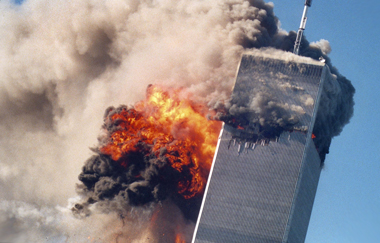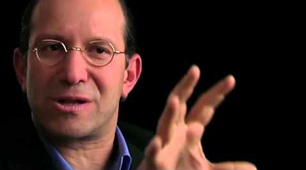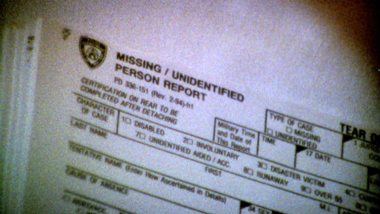
 |
|
|
|
After almost thirteen years, the 9/11 attack remains a touchstone issue, one not discussed lightly. Almost all mainstream films and documentaries about the terror attack have stuck with a respectful and constructive approach. Paul Greenglass's Flight 93 didn't abuse its subject matter, and a PBS documentary about why and how the towers fell dispelled most of the conspiracy theories. Although made by an insider who lost a brother in the Twin Towers, Out of the Clear Blue Sky is a reasonably objective and well researched film about the attack as experienced by the executives, employees and employees' family members of the financial trading firm Cantor Fitzgerald, an industry leader that occupied the top five floors (101-105) of the World Trade Center's North Tower. 658 of the 960 employees that called the offices their home were present and working at 8:45 a.m. when the first plane hit. The plane destroyed all three of the tower's exit stairwells, making escape impossible. 
Video news film of the attack is utilized, but director Gardner relies mostly on interviews with surviving executives and family members traumatized by the loss of their husbands, wives, fathers, mothers, sons and daughters. The show opens with a selection of memories of what it was like to work in offices that were often bathed in sunshine while rain fell on New York below. Then there's the horror of the attacks, the confusion and lack of information of what is happening and the panic that sets in when none of the employees in the tower seems to have survived. Since there are virtually no bodies -- the top five floors were incinerated, then pulverized -- family members cling to the hope that their loved ones will suddenly walk in the door. The show then moves on to document the bizarre roller coaster of events. The central personality is Cantor Fitzgerald's CEO Howard Lutnick, who at the time had a reputation as a hard-nosed, ruthless businessman. Lutnik also lost a brother in the North Tower. He survived only because he was dropping off his daughter on her first school day when the attack occurred. Despite himself being almost incoherent with grief for the better part of the day. Howard had to figure out what to do about the thousands of demands for information and help from family members. He also must think about keeping Cantor Fitzgerald afloat. The company's competitors simply watch and wait, and when a phone meeting is held to talk about re-opening the market, nobody even mentions the fact that Lutnik's physical headquarters and most of its personnel, including department heads and some entire departments, has been wiped out. Lutnik and another surviving executive rally their surviving resources to stay in business. They bring the company's London branch staff up to speed with New York procedures. 
Lutnik wasn't being cold and ruthless, thinking about money in a time of tragedy. When a small store owner is shot by a thief, his widow might not have the luxury of mourning, as the survival of her family requires that she continue to work the register and stock the shelves and smile at the customers as if nothing happened. Cantor Fitzgerald can fold and let its competitors take over, or it can struggle to survive. Of course some critics will call the executives callous or greedy. Cantor Fitzgerald recovery is a miracle made possible by Lutnik's dogged determination. He makes a deal with a bank that requires him to prove the company is running in one week, or cede ownership. When the market re-opens two days later, Cantor Fitzgerald is in business, doing transactions on notepads. The company's 'recovery' is big news in print and on the networks. Lutnik makes history when he is interviewed by the news shows of all three networks, and breaks down on camera. He promises to take care of his employees. Sympathy rises, with the effect that the company gains more clients than it can handle with its skeleton staff and provisional procedures. The bank's requirements are satisfied and the company remains intact. But potential disaster sets in soon afterward. Howard promised to take care of the families, but the lack of free funds forces him to cut off the salaries of the dead. He promises a better deal but is too busy keeping the company afloat. Fear and suspicion among the still-traumatized, suspicious survivors starts a wave of rumor that Lutnik is the same cold and ruthless businessman, and will renege on his promises. When the backlash and hatred hit the media, the clients that rallied to support Cantor Fitzgerald re-think their position. 
The protesting Cantor Fitzgerald families may sounds unreasonable until one considers their position. Were any of my close family wiped out like this I doubt I would exhibit a responsible emotional reaction. I'd be looking for someone to blame and something to make the pain stop. How many of us could be reasonable under similar conditions? I'd probably resent Lutnik for surviving the attack. Out of the Clear Blue Sky puts events into narrative form mostly through the interview testimony of CEO Lutnik, yet remains credibly objective. The situation is demonstrably unique. Hundreds of memorials and funerals are held even though few bodies are recovered. Nobody can attend them all but many families are resentful when Lutnik doesn't show. The threats and hate mail soon become an avalanche of negative public opinion. Howard follows through on his promise by devoting 25% of Cantor Fitzgerald's profits to the survivors of its murdered employees. Danielle Gardner's docu retains a strong human dimension. We see footage of concerned survivors screaming curses at meetings and describing their emotions in interviews. We also see through news film how the obliteration and recovery of the trading firm was followed closely by the news media. The show demonstrates how American business fights back and fights to survive. We also see home movies and video of people who were lost. Some of them look exceedingly wealthy, yet they are no less sympathetic than any of the other New Yorkers struck by the terror attack. The show doesn't tout Cantor Fitzgerald as an idealistic concern, even though the company later devoted time and effort to charity work beyond the foundation formed to aid the surviving families of employees. It's an engaging, guardedly positive story. |
|||||||||||||||||||
Review Staff | About DVD Talk | Newsletter Subscribe | Join DVD Talk Forum
Copyright © MH Sub I, LLC dba Internet Brands. | Privacy Policy
Subscribe to DVDTalk's Newsletters
|